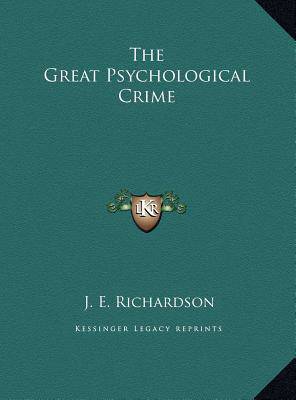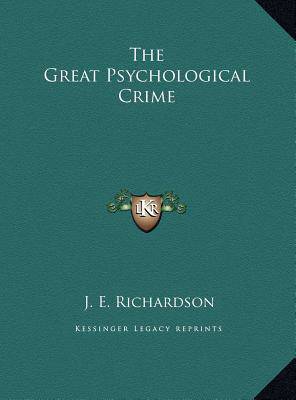
- Afhalen na 1 uur in een winkel met voorraad
- Gratis thuislevering in België vanaf € 30
- Ruim aanbod met 7 miljoen producten
- Afhalen na 1 uur in een winkel met voorraad
- Gratis thuislevering in België vanaf € 30
- Ruim aanbod met 7 miljoen producten
Zoeken
Omschrijving
The Great Psychological Crime is a book written by J. E. Richardson that explores the psychological manipulation and control of individuals by those in positions of power. The author argues that this manipulation is a form of crime that is often overlooked and undervalued by society. Richardson provides numerous examples of how individuals, groups, and institutions use psychological techniques to control and manipulate people, including propaganda, brainwashing, and other forms of psychological manipulation. The book also examines the ways in which individuals can protect themselves from such manipulation and regain control over their own lives. The Great Psychological Crime is a thought-provoking and insightful book that sheds light on a critical issue facing modern society.1928. The destructive principle of nature in individual life. Volume 2 of the Harmonic Series. This volume contains discussion relative to the following ideals. The destructive principle is that which dispels, disintegrates, dissipates or destroys any of nature's constructive individuality, whether they are physical, spiritual, mental, moral or psychical. A psychological crime is that which deprives the intelligent soul of any of the inalienable rights, privileges, benefits, powers or possibilities with which God or nature has invested it, as well as that which subjects the will, voluntary powers and sensory organism of the intelligent soul to the will and domination of another.This scarce antiquarian book is a facsimile reprint of the old original and may contain some imperfections such as library marks and notations. Because we believe this work is culturally important, we have made it available as part of our commitment for protecting, preserving, and promoting the world's literature in affordable, high quality, modern editions, that are true to their original work.
Specificaties
Betrokkenen
- Auteur(s):
- Uitgeverij:
Inhoud
- Aantal bladzijden:
- 396
- Taal:
- Engels
Eigenschappen
- Productcode (EAN):
- 9781169780309
- Verschijningsdatum:
- 10/09/2010
- Uitvoering:
- Hardcover
- Formaat:
- Genaaid
- Afmetingen:
- 216 mm x 279 mm
- Gewicht:
- 1197 g

Alleen bij Standaard Boekhandel
+ 138 punten op je klantenkaart van Standaard Boekhandel
Beoordelingen
We publiceren alleen reviews die voldoen aan de voorwaarden voor reviews. Bekijk onze voorwaarden voor reviews.











